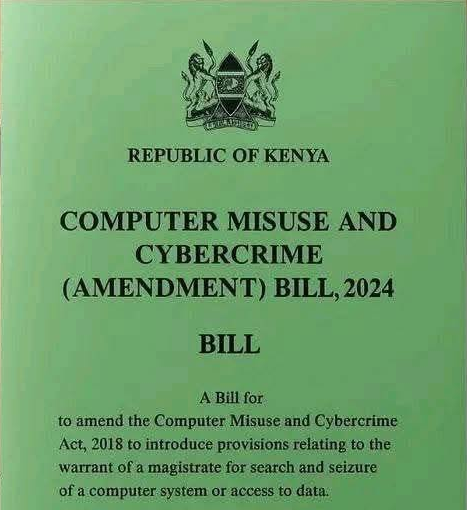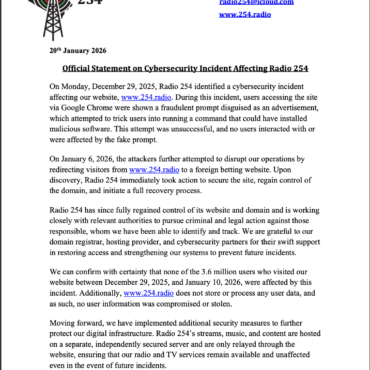In the ever-evolving theater of Kenyan politics, where drama often unfolds with the speed of a viral trend, President William Ruto’s recent signing of the Computer Misuse and Cybercrimes (Amendment) Bill, 2025, has emerged as the latest, and perhaps most consequential, plot twist. This legislation is more than a routine bureaucratic update; it appears to be a calculated maneuver by the government to potentially weaponize cybersecurity as a tool to muzzle dissent. Signed amidst the national focus on a significant political figure’s passing, this bill positions itself as a legalized framework for potentially silencing critics. The essential question remains: Is this a vital shield against genuine online chaos, or is it a sword aimed directly at the heart of free expression? Let’s unpack this complex situation with the scrutiny it deserves.
The Timing Tells the Tale: Signing Amid Shadows
The circumstances surrounding the bill’s enactment are arguably as telling as its content. The nation was grappling with the news of former Prime Minister Raila Odinga’s passing on October 15, 2025. While national mourning and tributes dominated the public and media spheres, President Ruto proceeded to sign not one, but eight bills into law at State House, the contentious cybercrimes amendment among them.
Critics were swift to label this a stealth move,suggesting the administration exploited a moment of collective distraction and grief to push through reforms that might otherwise have sparked immediate and intense backlash. This calculated timing is reminiscent of the political maneuvering seen during the 2024 Finance Bill protests, where youth-led, digitally-organized dissent forced the government to concede.
With Odinga’s death dominating headlines, the bill’s passage appears to be a strategic pivot: shifting the national focus away from accountability and popular discontent toward the maintenance of legislative power. The amendment, building on the 2018 act and championed by figures like former nominated senator Zipporah Kittony and Wajir East MP Aden Daudi Mohamed, was part of a broader legislative package. However, the cyber bill stands out, containing provisions sharp enough to potentially impede future digital activism.
In the sphere of political analysis, this timing feeds theories of autocratic sleight-of-hand. Why the urgency? Perhaps because the youth, energized by their 2024 victories and clearly equipped for 2025’s political and economic unrest, are proving to be too digitally savvy for the establishment’s comfort. This move serves as a stark reminder that in the realm of high-stakes politics, the strategic deployment of silence and distraction can be a powerful tool.
The Bill’s Bite: Provisions, Parodies, and Power Grabs
A deep dive into the text of Act No. 17 of 2025 reveals a complex mixture of legitimate cybersecurity enhancements interwoven with provisions that carry significant authoritarian potential. Ostensibly, the bill aims to bolster online security, expanding offenses to cover emerging threats like deepfakes, AI-generated harm, and “emotional distress“ caused by online harassment. The penalties are severe: up to 20 years’ imprisonment or fines substantial enough to cripple a small business. Yet, beneath the surface, it functions as a comprehensive potential anti-dissent mechanism.
The “cyber harassment“ clause, for instance, is vague and broad. The act of sharing a satirical post or even a critical meme that “annoys” someone could now place a citizen in legal jeopardy, with fines that seem disproportionate. This has led to the public coinage of the term “Meme Police Act.” Furthermore, the bill grants the government significant new powers, including the right to block websites without a court order during perceived “emergencies,” to mandate local registration for social media giants, and to monitor private communications suspected of “subversion.” This framework could potentially transform a private WhatsApp message discussing economic hardship into an act of “inducing panic,” carrying a penalty of up to KES 20 million in fines.
The legislative overreach extends to content creation, where bloggers with over 10,000 followers are now required to obtain a license—a provision satirically dubbed thevTikTok Tax.Such requirements could be used to curb political satire or critical commentary, turning perceived “defamation” into a severe, enforceable offense. With the High Court already suspending parts of the bill, such as Section 27, amid ongoing lawsuits, the legislation is not merely an update; it is viewed by many as a potential legal gateway for cracking down on the very tools that enable transparency and expose corruption.
Silencing the Streets from the Screens: Free Speech vs. the Firewall
The core of the public uproar is the classic dilemma: security or censorship? Proponents, largely government spokespeople, maintain that the bill is essential for tackling the rampant misinformation that, they argue, fueled violence during the 2024 protests, citing rising cyber fraud and foreign interference as justifications for tighter regulations.
Conversely, critics, including human rights organizations and digital activists, view the legislation as a direct response to the youth-led digital springs that have successfully challenged government policy and shaken the establishment. The 2024 and 2025 youth movements demonstrated the potent ability of digital coordination to transform hashtags into real-world accountability. With reports of arrests of online activists increasing following the bill’s signing, the legislation is widely perceived as a deliberate strategy to dismantle those digital networks.
The debate is focused on how to balance legitimate national security concerns with the imperative of protecting free speech. In a nation where protests have had fatal consequences, the inclusion of vaguely defined offenses such as “false information inciting disorder” is viewed by many as a potential pretext for preemptive, politically-motivated arrests. Kenya’s legislation is not isolated; it represents a burgeoning playbook for governments seeking to quell dissent in the digital age, where the power of a single social media post can be revolutionary.
Echoes Across East Africa: Autocracy’s Digital Drift and a Prophet’s Warning
Viewing Kenya’s cyber bill within a regional and global context reveals a disconcerting pattern. Inspired by digital-fueled youth uprisings across South Asia—such as the 2024 quota protests in Bangladesh or Sri Lanka’s 2022 economic revolt—East African regimes are increasingly fortifying both their physical streets and their digital servers. The use of internet shutdowns has doubled across the continent since 2016, with countries like Tanzania and Sudan utilizing blackouts to throttle the organization of dissent.
From Uganda’s social media taxes to Ethiopia’s hate speech laws, the region is witnessing the emergence of a hybrid autocracy: traditional methods of suppression now coupled with sophisticated digital muzzles. Kenya’s bill, with its expanded surveillance capabilities, risks escalating this trend. While such measures may temporarily fragment movements, they have historically ignited a fiercer, more organized backlash, as seen in Senegal’s 2025 shutdowns.
The analysis of Kenyan thinker Nanjala Nyabola offers a crucial prophetic warning. In her seminal work, Digital Democracy, Analogue Politics, she accurately anticipated the double-edged nature of social media, empowering youth while simultaneously inviting crackdowns from established political elites. Her recent writings on the contemporary Gen Z protests highlight them as a “global constituency“ facing systemic inequality, with technology accelerating their demands.
Nyabola’s consistent counsel is a plea for inclusion over suppression, arguing that governments will respond with digital iron fists but ultimately ignore the digitally empowered youth at their own peril. As East Africa navigates this turbulent digital political landscape, Kenya’s new bill is seen as a crucial test case—a spark that may either be extinguished by judicial review and public resistance or used to ignite a new era of digital authoritarianism. The discourse, thankfully, shows no signs of sleeping.
This article was written by Otieno Arudo




